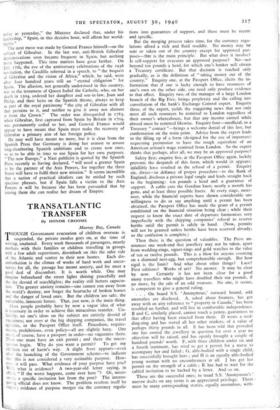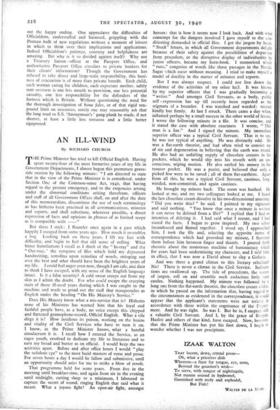TRANSATLANTIC TRANSFER
By HONOR CROOME
Murray Bay, Canada THOUGH Government evacuation of children overseas is suspended, the private exodus goes on, at the time of writing, unabated. Every week thousands of passengers, mostly mothers with their families or children travelling in groups with a few adult supervisors, disembark on this the safer side of the Atlantic and scatter to their new homes. Each dis- embarkation is the climax of weeks of hard work and uncer- tainty; for all, the passage has meant anxiety, and for most a good deal of discomfort. It is worth while. One may imagine beforehand the street lights shining peacefully and the sky devoid of searchlights; the reality still betters expecta- tion. The greater anxiety remains—one cannot run away from the world's destiny, nor forget the heartache of broken homes and the danger of loved ones. But the children are safe; the vulnerable, innocent future. That, just now, is the main thing.
Most people probably have by now a vague idea of what is necessary in order to achieve this miraculous transfer. Un- luckily, no one's ideas on the subject are entirely devoid of vagueness; not even at the big shipping companies, the travel agencies, or the Passport Office itself. Procedure, require- ments, prohibitions, even policy—all are slightly hazy. One mutt, of course, have a passport in order—no vagueness there. Thin one must have an exit permit ; and there the uncer- tainties begin. Why do you want a permit? To get my chil.iren out of harm's way. A slight frost appears—even after the launching of the Government scheme—to indicate tha: this is not considered a very estimable purpose. How- eve-, it will pass. What evidence of your purpose have you? g'e'l, what is evidence? A two-year-old letter saying, in effect, "If the worst happens, come over here "? Or, neces- Y, a specific invitation hot from the post? The interro- gating official does not know. The problem resolves itself by stag, :s ; evidence of purpose merges via the currency regula- tions into guarantees of support, and these must be recent and specific.
But the merging process takes time, for the currency regu- lations afford a rich and fluid muddle. No money may be sent or taken out of the country except for approved pur- poses—that is the main principle. But what does it involve? Is self-support for evacuees an approved purpose? No—not beyond ten pounds a head, for which one's banker will obtain a Treasury certificate. But that decision is reached only gradually, as is the definition of " taking money out of the country." Enquiry one, at the Passport Office, elicits the in- formation that if one is lucky enough to have resources of one's own on the other side, one need only produce evidence to that effect. Enquiry two, of the manager of a large London branch of the Big Five, brings perplexity and the calling into consultation of the bank's Exchange Control expert. Enquiry three, of the expert, yields the staggering news that not only must all such resources be remitted to London regardless of their owner's whereabouts, but that any income earned while abroad must be remitted likewise. Enquiry four—unofficial, to a Treasury " contact "—brings a welcome denial of this last, but confirmation on the main point. Advice from the expert leads to the filling up of a form (designed for the use of importers) requesting permission to have the rough equivalent of an American artisan's wage remitted from London. So the expert thinks that perhaps, after all, we may be an approved purpose?
Safety first; enquiry five, at the Passport Office again, luckily prevents the despatch of this form, which would (it appears) infallibly have resulted in the refusal of a permit. Enquiry six, direct—in defiance of proper procedure—to the Bank of England, discloses a private legal tangle and leads straight back to the beginning: ten pounds a head and a guarantee of support. A cable cuts the Gordian knot; nearly a month has gone, and at least three possible liners. At every stage, more- over, while the financial experts have shoivn considerable un- willingness to do or say anything until a permit has been obtained, the Passport Office has made the grant of a permit conditional on the financial situation being clear ; while their request to know the exact date of departure harmonises very imperfectly with the shipping companies' refusal to reserve berths until the permit is safely in hand. (Now, permits will not be granted unless berths have been reserved already; so the confusion is complete.) Then there is the question of valuables. The Press an- nounces one week-end that jewellery may not be taken, apart from wedding-rings, signet-rings and gold watches to the value of ten or twelve pounds. This is a blow for anyone counting on a diamond nest-egg, but comprehensible enough. But how rigid is the limit? And what about other things? Lace? First editions? Works of art? No answer. It may be clear by now. Certainly it has not been clear for a good many travellers who might have doubled their ten pounds, if no more, by the sale of an odd treasure. No one, it seems, is competent to give a general ruling.
. . . On board S.S. Anonymous,' outward bound, odd anomalies are disclosed. A, asked about finances, has got away with an airy reference to " property in Canada," has been troubled no further, and will live in comfortable independence. B and C, similarly placed, cannot touch a penny, guarantees to that effect having been exacted from them. D wears a wed- ding-ring and has stored all her other trinkets, of a value of perhaps thirty pounds in all. E has been told that provided one has owned the jewellery in question for over a year no objection will be raised, and has openly brought a couple of hundred pounds' worth. F, with three children under six and a fourth imminent, has tried to get a perrait for a nurse to accompany her and failed ; G, able-bodied with a single child, has successfully brought hers ; and H is an equally able-bodied young woman with no encumbrances at all. J has got her permit on the strength of a cable ; K has had to wait for the cabled invitation to be backed by a letter. And so on.
These are the successful ones; to tread S.S. 'Anonymous's ' narrow decks on any terms is an appreciated privilege. There • must be many corresponding stories, equally anomalous, with- out the happy ending. One appreciates the difficulties of Officialdom, understaffed and harassed, grappling with the Protean bulk of new regulations without a moment of leisure in which to think over their implications and applications. Indeed Officialdom's patience, courtesy and helpfulness are amazing. But why is it so divided against itself? Why not a Treasury liaison - officer at the Passport Office, and authoritative Passport Office circulars to private bankers for their clients' information? Though the Government has refused to take direct and large-scale responsibility, this busi- ness of evacuation is of more than private benefit. Each child, each woman caring for children, each expectant mother, safely sent overseas is one less mouth to provision, one less potential casualty, one less responsibility for the defenders of the fortress which is Britain. Without questioning the need for the thorough investigation of bona fides, or of that rigid ten- pound limit on resources, surely one may reasonably ask that the long road to S.S. 'Anonymous's ' gang-plank be made, if not shorter, at least a little less tortuous and a little better signposted.



























 Previous page
Previous page